Module 1 Unit 1 Did you come back yesterday?教学课件(共41张PPT+素材)
文档属性
| 名称 | Module 1 Unit 1 Did you come back yesterday?教学课件(共41张PPT+素材) |
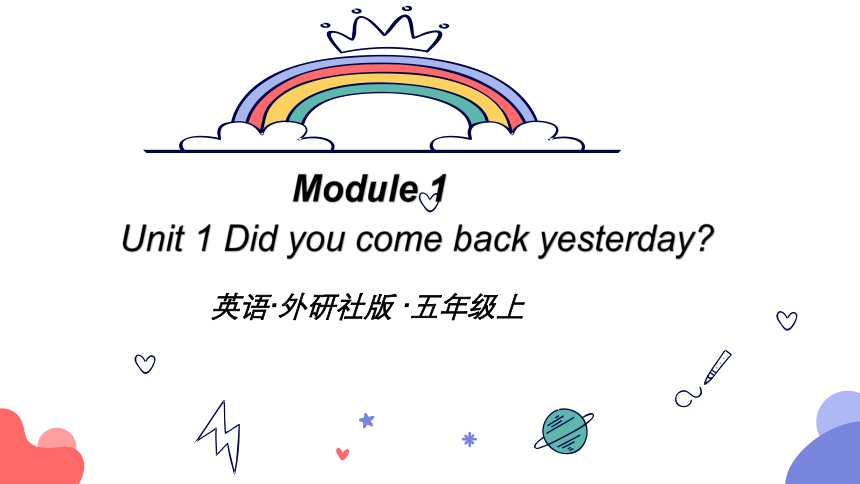
|
|
| 格式 | zip | ||
| 文件大小 | 15.3MB | ||
| 资源类型 | 教案 | ||
| 版本资源 | 外研版(三年级起点) | ||
| 科目 | 英语 | ||
| 更新时间 | 2020-07-26 00:00:00 | ||
图片预览

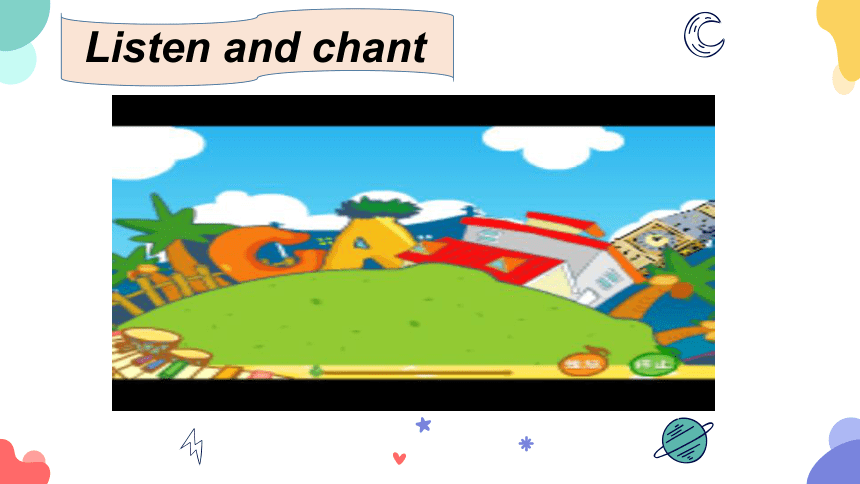
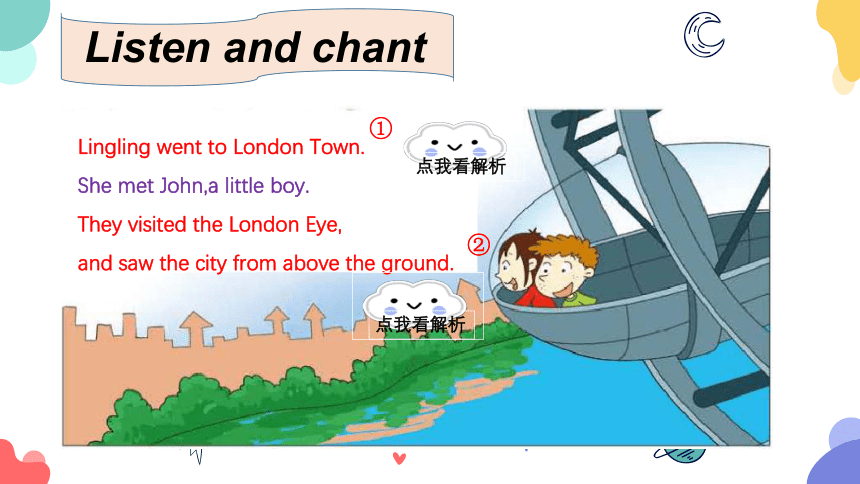
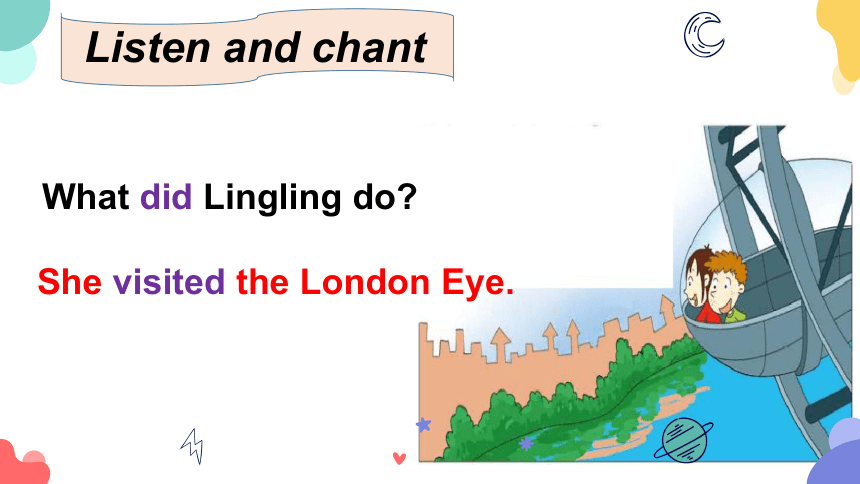

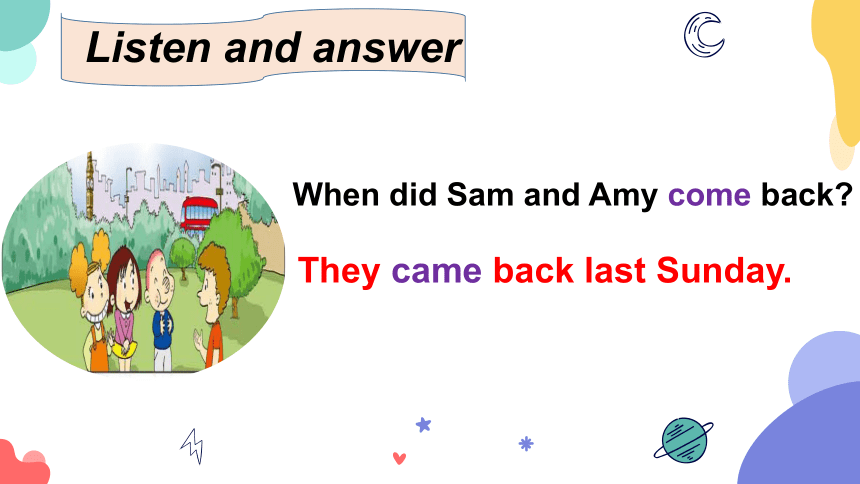
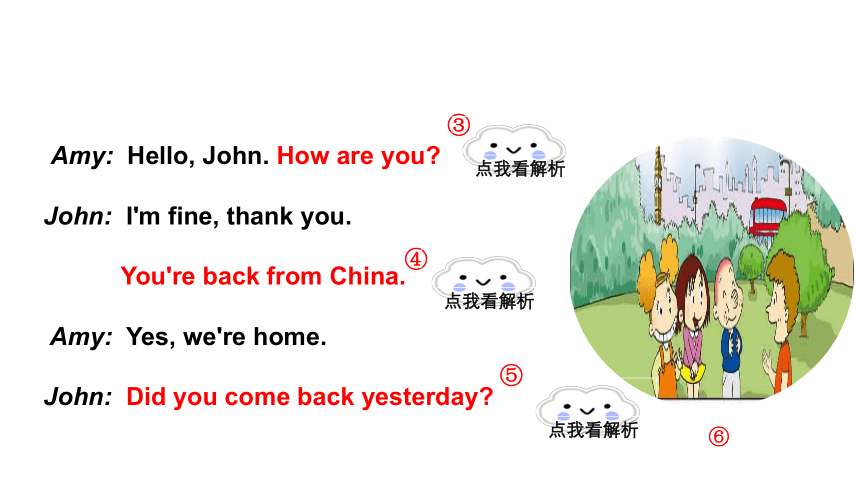
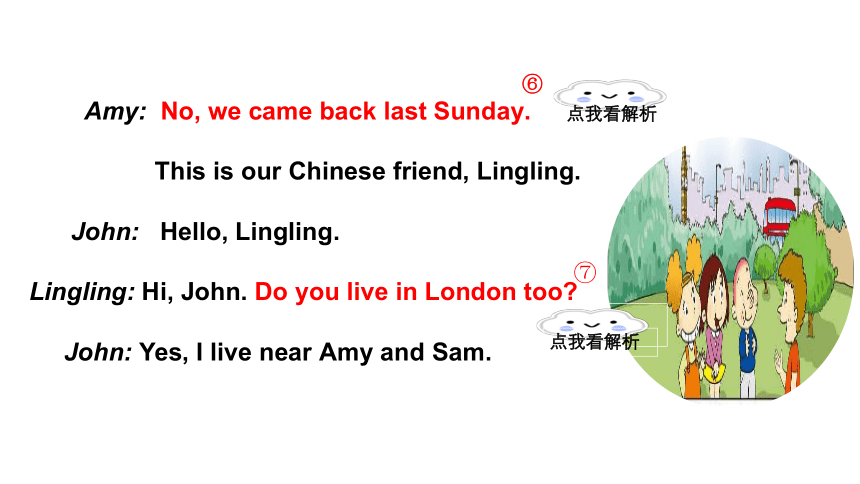
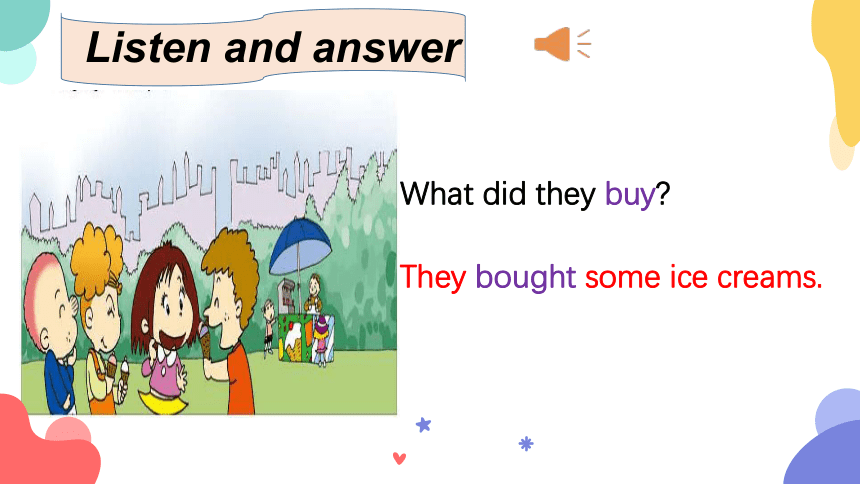
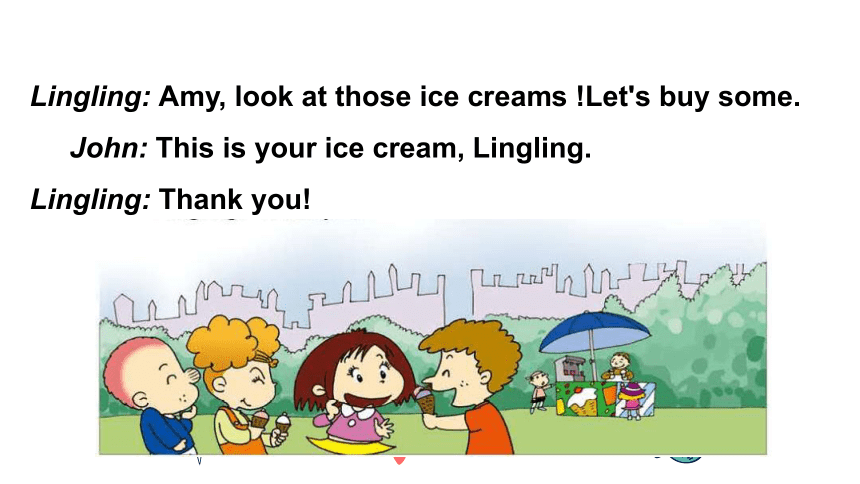
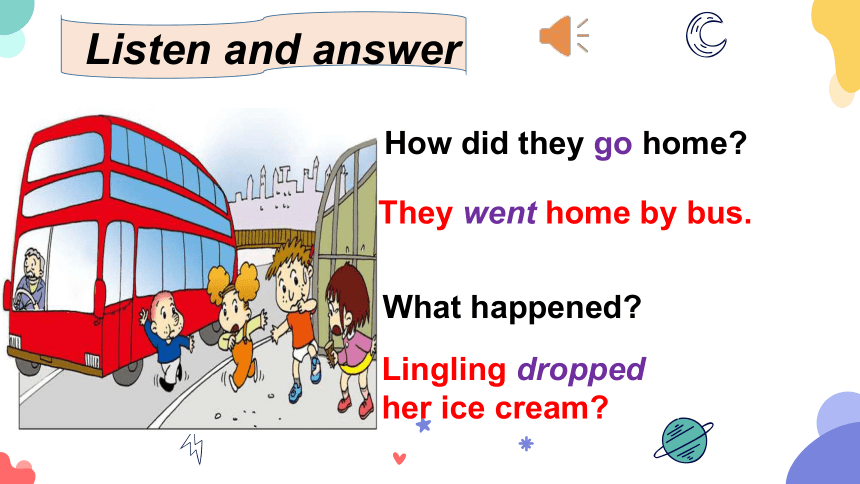
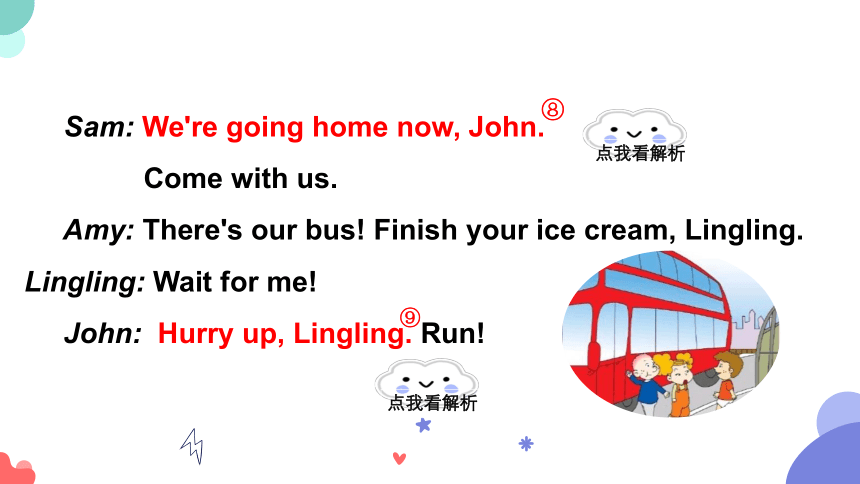
文档简介
(共41张PPT)
Unit
1
Did
you
come
back
yesterday?
英语·外研社版
·五年级上
Module
1
Listen
and
chant
Listen
and
chant
Lingling
went
to
London
Town.
She
met
John,a
little
boy.
They
visited
the
London
Eye,
and
saw
the
city
from
above
the
ground.
①
点我看解析
②
点我看解析
Listen
and
chant
What
did
Lingling
do?
She
visited
the
London
Eye.
Listen
and
read
Listen
and
answer
When
did
Sam
and
Amy
come
back?
They
came
back
last
Sunday.
Amy:
Hello,
John.
How
are
you?
John:
I'm
fine,
thank
you.
You're
back
from
China.
Amy:
Yes,
we're
home.
John:
Did
you
come
back
yesterday?
③
点我看解析
④
⑤
⑥
点我看解析
点我看解析
Amy:
No,
we
came
back
last
Sunday.
This
is
our
Chinese
friend,
Lingling.
John:
Hello,
Lingling.
Lingling:
Hi,
John.
Do
you
live
in
London
too?
John:
Yes,
I
live
near
Amy
and
Sam.
点我看解析
⑥
⑦
点我看解析
Listen
and
answer
What
did
they
buy?
They
bought
some
ice
creams.
Lingling:
Amy,
look
at
those
ice
creams
!Let's
buy
some.
John:
This
is
your
ice
cream,
Lingling.
Lingling:
Thank
you!
Listen
and
answer
How
did
they
go
home?
They
went
home
by
bus.
What
happened?
Lingling
dropped
her
ice
cream?
Sam:
We're
going
home
now,
John.
Come
with
us.
Amy:
There's
our
bus!
Finish
your
ice
cream,
Lingling.
Lingling:
Wait
for
me!
John:
Hurry
up,
Lingling.
Run!
⑧
点我看解析
⑨
点我看解析
Lingling:
Oh
no!
I
dropped
my
ice
cream!
John:
Oh
no!
My
new
shoes!
Act
out
四人一组2分钟准备时间,分组展示表演成果
Listen
and
say
No,we
came
back
last
Sunday.
Oh
no!I
dropped
my
ice
cream!
Practise
Practise
Practise
-Did
you
go
to
school?
-No,I
didn't.Yesterday
It
was
Sunday
-Did
you
do
your
homework?
-No,I
didn't.
Practise
Practise
She________
TV
yesterday.
watched
She____her
homework
last
night.
did
They
_______
to
school.
went
She
_______
her
ice
creams.
dropped
Exercise
1.They____the
London
Eye.
A.visit
B.visits
C.visited
2.She_____John.
A.meet
B.met
C.meets
3.We____back
last
Sunday.
A.came
B.come
C.comes
4.Look___
those
ice
creams.
A.from
B.to
C.at
5.Come_____us.
A.to
B.and
C.with
6.I____my
ice
cream!
A.drop
B.droped
C.dropped
Homework
Read
the
dialogue
talk
with
your
partner
Thank
you
这是一个一般过去时的陈述句。一般过去时表示过去发生的动作或存在的状态。
拓展
一般过去时的基本形式是:
(1)含实义动词的一般过去时:主语十动词过去式十其他。
(2)含be动词的一般过去时:主语+was/were+其他。
We
went
to
Beijing
last
week.
我们上周去北京了。
He
was
late
for
school
yesterday.
他昨天上学迟到了。
1.Lingling
went
to
London
Town.
玲玲去了伦敦城。
(1)visit
为动词,意为“参观,游览,拜访”,
常用于“visit十某地或某人”结构中。当visit后接地点时,通常意为“参观/游览某地”;
当
visit
后接人时,通常意为“拜访/看望某人”。
2.They
visited
the
London
Eye,and
saw
the
city
from
above
the
ground.
他们参观了伦敦眼,并且在地面上方看到了这座城市。
人称为代词时,要用宾格形式,
如:visit
him/her/me/us/you/them.
I'm
going
to
visit
the
Summer
Palace.
I
visited
my
grandpa
yesterday.
(2)above
为介词,意为“在······上方,在······之上
(不与物体表面接触的上方)”。
(1)visit可以做名词,后接
to.例如:
It
was
his
first
visit
to
New
York.
(2)above,on与over的区别:above在......上方,不接触物体表面;
on在······上面,在物体表面上;over
在物体的垂直正上方。
They
saw
a
plane
above
the
ground.
拓展
(1)用来问候健康状况,意为“你身体如何?”。
-How
are
you
today?
-Fine,thank
you.
/Thanks,
I'm
much
better.
(2)用于久别重逢的熟人之间的问候,意为“你最近好吗?”。
-How
are
you?
-Fine,thank
you.
And
you?
(3)用作初次见面的问候语,(主要用于美式英语中)意为“你好吗?”
-This
is
Jim
and
this
is
Tom.
-Hi,
Jim.
How
are
you?
3.How
are
you?
你好吗?
be
back
from
意为“从······回来”,from是介词,表示“从......”be的具体形式要看与其搭配的主语。
I
am
back
from
China.
我从中国回来。
They
are
back
from
China.
他们从中国回来。
He
is
back
from
China.
他从中国回来。
4.You're
back
from
China!
你们从中国回来了!
be
back
from
还可以表示为
come
back
from,come
的形
式要根据主语的人称,以及句子的时态变化而变化。
I
come
back
from
China.
我从中国回来。
He
comes
back
from
China.
他从中国回来。
I
come
back
from
school.
我从学校回来。
拓展
此句是一个含有实义动词的一般过去时的一般疑问句。
句型结构:Did十主语十动词原形(短语)十其他?
答语:“Yes,
主语十did.
,
主语+didn't.
”。
5.Did
you
come
back
yesterday?
你们是昨天回来的吗?
原形
过去式
meet
met
go
went
see
saw
do
did
come
came
原形
过去式
drop
dropped
have/has
had
buy
bought
visit
visited
watch
watched
Summary
last在此处为形容词,意为“上个的,最近的,刚刚过去的”,last与表示时间的词连用表示过去的时间状语:
last
week
上周;last
month
上个月;last
year去年;last
night
昨天晚上。
We
watched
TV
last
night.
我们昨天晚上看电视了。
6.No,we
came
back
last
Sunday.
不,我们上周日回来的。
(1)live做动词。
①live做不及物动词,意为“住,居住”。
She
lives
in
Beijing.
她住在北京。
②意为“活,活着”。
The
baby
only
lived
a
few
hours.
这个婴儿只活了几个小时。
7.Do
you
live
in
London
too?
你也住在伦敦吗?
③live做及物动词,意为“过(生活);
度过”。
The
old
man
lived
a
happy
life,
那个老人过着幸福的生活。
(2)too为副词,意为“也,还”,
常用于肯定句句末,在口语中,
too有时也用于疑问句句末,表示渴望得到对方的肯定答复。
He
learns
English
too.
他也学英语。
Can
I
come
too?
我也可以来吗?
too,either区别
这是一个现在进行时的句子。在英语中come、go、leave
等,可以用其进行时表示将来。
Look,the
bus
is
coming!
看,公共汽车要来了!
He's
leaving
for
Beijing.
他要动身去北京。
8.We're
going
home
now,
John.
我们现在要回家了,约翰。
在英语中,我们还经常用“be
going
to+动词原形”结构表示将来,通常表示近期、眼下就要发生的或打算、计划的事情。
I'm
going
to
leave.
我要离开了。
拓展
(1)hurry是动词,意为“赶紧,匆忙”。
No
need
to
hurry.
不必急急忙忙。
(2)hurry还意为“催促”。
They
hurried
us
into
the
car.
9.Hurry
up,
Lingling.
快点儿,玲玲。
与
hurry
有关的短语:hurry
up快点,in
a
hurry匆忙。
Hurry
up.or
we'll
be
late
for
class.
I'm
in
a
hurry
to
leave.
拓展
Unit
1
Did
you
come
back
yesterday?
英语·外研社版
·五年级上
Module
1
Listen
and
chant
Listen
and
chant
Lingling
went
to
London
Town.
She
met
John,a
little
boy.
They
visited
the
London
Eye,
and
saw
the
city
from
above
the
ground.
①
点我看解析
②
点我看解析
Listen
and
chant
What
did
Lingling
do?
She
visited
the
London
Eye.
Listen
and
read
Listen
and
answer
When
did
Sam
and
Amy
come
back?
They
came
back
last
Sunday.
Amy:
Hello,
John.
How
are
you?
John:
I'm
fine,
thank
you.
You're
back
from
China.
Amy:
Yes,
we're
home.
John:
Did
you
come
back
yesterday?
③
点我看解析
④
⑤
⑥
点我看解析
点我看解析
Amy:
No,
we
came
back
last
Sunday.
This
is
our
Chinese
friend,
Lingling.
John:
Hello,
Lingling.
Lingling:
Hi,
John.
Do
you
live
in
London
too?
John:
Yes,
I
live
near
Amy
and
Sam.
点我看解析
⑥
⑦
点我看解析
Listen
and
answer
What
did
they
buy?
They
bought
some
ice
creams.
Lingling:
Amy,
look
at
those
ice
creams
!Let's
buy
some.
John:
This
is
your
ice
cream,
Lingling.
Lingling:
Thank
you!
Listen
and
answer
How
did
they
go
home?
They
went
home
by
bus.
What
happened?
Lingling
dropped
her
ice
cream?
Sam:
We're
going
home
now,
John.
Come
with
us.
Amy:
There's
our
bus!
Finish
your
ice
cream,
Lingling.
Lingling:
Wait
for
me!
John:
Hurry
up,
Lingling.
Run!
⑧
点我看解析
⑨
点我看解析
Lingling:
Oh
no!
I
dropped
my
ice
cream!
John:
Oh
no!
My
new
shoes!
Act
out
四人一组2分钟准备时间,分组展示表演成果
Listen
and
say
No,we
came
back
last
Sunday.
Oh
no!I
dropped
my
ice
cream!
Practise
Practise
Practise
-Did
you
go
to
school?
-No,I
didn't.Yesterday
It
was
Sunday
-Did
you
do
your
homework?
-No,I
didn't.
Practise
Practise
She________
TV
yesterday.
watched
She____her
homework
last
night.
did
They
_______
to
school.
went
She
_______
her
ice
creams.
dropped
Exercise
1.They____the
London
Eye.
A.visit
B.visits
C.visited
2.She_____John.
A.meet
B.met
C.meets
3.We____back
last
Sunday.
A.came
B.come
C.comes
4.Look___
those
ice
creams.
A.from
B.to
C.at
5.Come_____us.
A.to
B.and
C.with
6.I____my
ice
cream!
A.drop
B.droped
C.dropped
Homework
Read
the
dialogue
talk
with
your
partner
Thank
you
这是一个一般过去时的陈述句。一般过去时表示过去发生的动作或存在的状态。
拓展
一般过去时的基本形式是:
(1)含实义动词的一般过去时:主语十动词过去式十其他。
(2)含be动词的一般过去时:主语+was/were+其他。
We
went
to
Beijing
last
week.
我们上周去北京了。
He
was
late
for
school
yesterday.
他昨天上学迟到了。
1.Lingling
went
to
London
Town.
玲玲去了伦敦城。
(1)visit
为动词,意为“参观,游览,拜访”,
常用于“visit十某地或某人”结构中。当visit后接地点时,通常意为“参观/游览某地”;
当
visit
后接人时,通常意为“拜访/看望某人”。
2.They
visited
the
London
Eye,and
saw
the
city
from
above
the
ground.
他们参观了伦敦眼,并且在地面上方看到了这座城市。
人称为代词时,要用宾格形式,
如:visit
him/her/me/us/you/them.
I'm
going
to
visit
the
Summer
Palace.
I
visited
my
grandpa
yesterday.
(2)above
为介词,意为“在······上方,在······之上
(不与物体表面接触的上方)”。
(1)visit可以做名词,后接
to.例如:
It
was
his
first
visit
to
New
York.
(2)above,on与over的区别:above在......上方,不接触物体表面;
on在······上面,在物体表面上;over
在物体的垂直正上方。
They
saw
a
plane
above
the
ground.
拓展
(1)用来问候健康状况,意为“你身体如何?”。
-How
are
you
today?
-Fine,thank
you.
/Thanks,
I'm
much
better.
(2)用于久别重逢的熟人之间的问候,意为“你最近好吗?”。
-How
are
you?
-Fine,thank
you.
And
you?
(3)用作初次见面的问候语,(主要用于美式英语中)意为“你好吗?”
-This
is
Jim
and
this
is
Tom.
-Hi,
Jim.
How
are
you?
3.How
are
you?
你好吗?
be
back
from
意为“从······回来”,from是介词,表示“从......”be的具体形式要看与其搭配的主语。
I
am
back
from
China.
我从中国回来。
They
are
back
from
China.
他们从中国回来。
He
is
back
from
China.
他从中国回来。
4.You're
back
from
China!
你们从中国回来了!
be
back
from
还可以表示为
come
back
from,come
的形
式要根据主语的人称,以及句子的时态变化而变化。
I
come
back
from
China.
我从中国回来。
He
comes
back
from
China.
他从中国回来。
I
come
back
from
school.
我从学校回来。
拓展
此句是一个含有实义动词的一般过去时的一般疑问句。
句型结构:Did十主语十动词原形(短语)十其他?
答语:“Yes,
主语十did.
,
主语+didn't.
”。
5.Did
you
come
back
yesterday?
你们是昨天回来的吗?
原形
过去式
meet
met
go
went
see
saw
do
did
come
came
原形
过去式
drop
dropped
have/has
had
buy
bought
visit
visited
watch
watched
Summary
last在此处为形容词,意为“上个的,最近的,刚刚过去的”,last与表示时间的词连用表示过去的时间状语:
last
week
上周;last
month
上个月;last
year去年;last
night
昨天晚上。
We
watched
TV
last
night.
我们昨天晚上看电视了。
6.No,we
came
back
last
Sunday.
不,我们上周日回来的。
(1)live做动词。
①live做不及物动词,意为“住,居住”。
She
lives
in
Beijing.
她住在北京。
②意为“活,活着”。
The
baby
only
lived
a
few
hours.
这个婴儿只活了几个小时。
7.Do
you
live
in
London
too?
你也住在伦敦吗?
③live做及物动词,意为“过(生活);
度过”。
The
old
man
lived
a
happy
life,
那个老人过着幸福的生活。
(2)too为副词,意为“也,还”,
常用于肯定句句末,在口语中,
too有时也用于疑问句句末,表示渴望得到对方的肯定答复。
He
learns
English
too.
他也学英语。
Can
I
come
too?
我也可以来吗?
too,either区别
这是一个现在进行时的句子。在英语中come、go、leave
等,可以用其进行时表示将来。
Look,the
bus
is
coming!
看,公共汽车要来了!
He's
leaving
for
Beijing.
他要动身去北京。
8.We're
going
home
now,
John.
我们现在要回家了,约翰。
在英语中,我们还经常用“be
going
to+动词原形”结构表示将来,通常表示近期、眼下就要发生的或打算、计划的事情。
I'm
going
to
leave.
我要离开了。
拓展
(1)hurry是动词,意为“赶紧,匆忙”。
No
need
to
hurry.
不必急急忙忙。
(2)hurry还意为“催促”。
They
hurried
us
into
the
car.
9.Hurry
up,
Lingling.
快点儿,玲玲。
与
hurry
有关的短语:hurry
up快点,in
a
hurry匆忙。
Hurry
up.or
we'll
be
late
for
class.
I'm
in
a
hurry
to
leave.
拓展
同课章节目录
- Module 1
- Unit 1 Did you come back yesterday?
- Unit 2 We bought ice creams.
- Module 2
- Unit 1 What did you buy?
- Unit 2 How much cheese did you buy?
- Module 3
- Unit 1 Where did you go?
- Unit 2 Daming took a photo of his father.
- Module 4
- Unit 1 Mum bought a new T-shirt for me.
- Unit 2 What's the matter with Daming?
- Module 5
- Unit 1 There are only nineteen crayons
- Unit 2 There are forty.
- Module 6
- Unit 1 You can play football well.
- Unit 2 He ran very fast.
- Module 7
- Unit 1 He can't see.
- Unit 2 This little girl can't walk.
- Module 8
- Unit 1 What time does your school start?
- Unit 2 Yesterday I went to Sam and Amy's school.
- Module 9
- Unit 1 Are you feeling bored?
- Unit 2 I feel happy.
- Review Module
- Unit 1
- Unit 2
- Module 10
- Unit 1 He was in the kitchen.
- Unit 2 Don't shout, please!
- 旧版资料
- Module 1 London
- Module 2 Shopping
- Module 3 At the Weekend
- Module 4 Possession
- Module 5 In Class
- Module 6 Self-assessment
- Module 7 Community
- Module 8 School
- Module 9 Feelings
- Module 10 Manners
- Review Module
